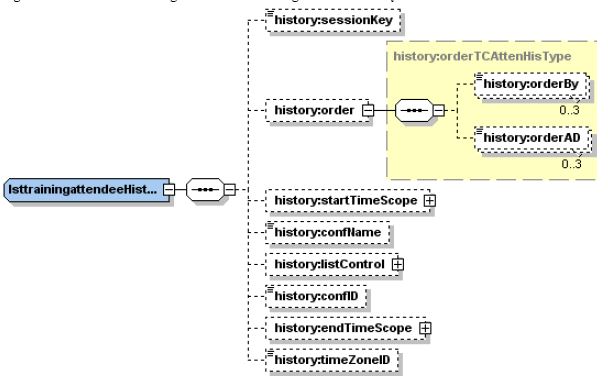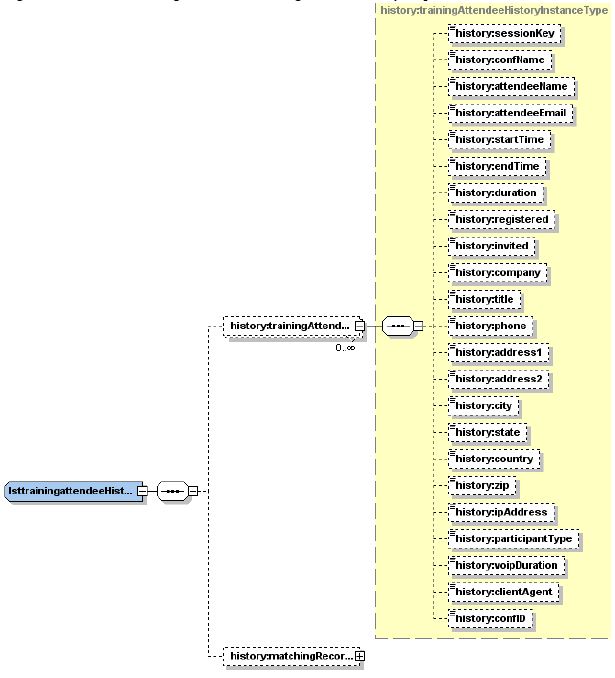LsttrainingattendeeHistory
Allows training session hosts to request detailed attendee information for any training session previously hosted on the site.
Note Site administrators can retrieve the attendee information of all the training sessions hosted on their sites, but regular hosts can only retrieve the attendee information of their own training sessions.
Request
The sample XML document shows an example of a request to list the attendee information of the training sessions for the specified period of time.
<?xml version="1.0" encoding="UTF-8"?>
<serv:message xmlns:xsi="http://www.w3.org/2001/XMLSchema-instance">
<header>
<securityContext>
<webExID>hostid</webExID>
<password>hostpassword</password>
<siteID>0000</siteID>
<partnerID>9999</partnerID>
<email>johnsmith@xyz.com</email>
</securityContext>
</header>
<body>
<bodyContent xsi:type=
"java:com.webex.service.binding.history.LsttrainingattendeeHistory">
<startTimeScope>
<sessionStartTimeStart>03/28/2004 02:31:24
</sessionStartTimeStart>
<sessionStartTimeEnd>03/31/2004 02:31:24</sessionStartTimeEnd>
</startTimeScope>
<endTimeScope>
<sessionEndTimeStart>03/28/2004 00:31:24</sessionEndTimeStart>
<sessionEndTimeEnd>04/1/2004 02:31:24</sessionEndTimeEnd>
</endTimeScope>
<listControl>
<serv:startFrom>1</serv:startFrom>
<serv:maximumNum>10</serv:maximumNum>
<serv:listMethod>AND</serv:listMethod>
</listControl>
<order>
<orderBy>NAME</orderBy>
<orderAD>ASC</orderAD>
</order>
</bodyContent>
</body>
</serv:message>
The following schema diagram shows the structure of the elements in the lsttrainingattendeeHistory request message.
Figure 9-21 • Schema diagram for lsttrainingattendeeHistory
For descriptions of the global elements in the security context of the header, please see Global Request Elements in Security Context. For descriptions of the non-global elements, please refer to “Elements in WebEx XML Schema Definitions for the History Service”.
Response
The sample XML document shows an example of a possible response to the preceding request document.
<?xml version="1.0" encoding="UTF-8"?>
<serv:message xmlns:serv="http://www.webex.com/schemas/2002/06/service"
xmlns:com="http://www.webex.com/schemas/2002/06/common"
xmlns:history="http://www.webex.com/schemas/2002/06/service/history">
<serv:header>
<serv:response>
<serv:result>SUCCESS</serv:result>
<serv:gsbStatus>PRIMARY</serv:gsbStatus>
</serv:response>
</serv:header>
<serv:body>
<serv:bodyContent
xsi:type="history:LsttrainingattendeeHistoryResponse"
xmlns:xsi="http://www.w3.org/2001/XMLSchema-instance">
<history:trainingAttendeeHistory>
<history:sessionKey>87745560</history:sessionKey>
<history:confName>java for XML schedule meeting
</history:confName>
<history:attendeeName>xml xml</history:attendeeName>
<history:attendeeEmail>xml@sz.webex.com</history:attendeeEmail>
<history:startTime>03/29/2004 01:31:25</history:startTime>
<history:endTime>03/29/2004 01:41:35</history:endTime>
<history:duration>11</history:duration>
<history:ipAddress>172.16.244.151</history:ipAddress>
<history:participantType>HOST</history:participantType>
<history:voipDuration>0</history:voipDuration>
<history:clientAgent>WINDOWS,IE</history:clientAgent>
<history:confID>4702308</history:confID>
</history:trainingAttendeeHistory>
<history:matchingRecords>
<serv:total>1</serv:total>
<serv:returned>1</serv:returned>
<serv:startFrom>1</serv:startFrom>
</history:matchingRecords>
</serv:bodyContent>
</serv:body>
</serv:message>
The following schema diagram shows the structure of the elements in the lsttrainingattendeeHistoryResponse message.
Figure 9-22 • Schema diagram for lsttrainingattendeeHistoryResponse
The result and exceptionID global elements allow you to confirm that an instantiation request was successful. See Global Response Elements Showing Results and Errors.

